|
Belarusian Education: A short-term victory or a long-term loss?
Svetlana Matskevich
Summary
Belarusian education in 2010 after the end of the interrupted reform of higher school continues to stagnate. Trying to perform according to the standards dictated by the Ministry of Education the educational establishments lose creativity and strategic prospect in their work and confine themselves more and more to formalization and standardization tasks. As a result, even having high indices of population involvement in the educational system, the training quality of secondary and tertiary schools remains the object of criticism from both students and the country leaders.
The major event in the educational sphere in 2010 was the adoption of the Education Code. Despite the attempt to imitate the discussion of this document among the interested public, its final variant does not include the additions and remarks made by civic organizations and civil initiatives.
Last year the third sector initiatives in the field of alternative education continued to develop but they are of local character and cannot influence the state of the Belarusian education in general.
Tendencies:
- Quantitative and qualitative indices in the educational system decrease: the number of pupils and teachers at schools decreases, the former structure is preserved, ideological content of education remains invariable;
- The involvement of people over 25 into the training process decreases;
- The state remains a monopolist in the educational field and using its position to simulate dialogue with other subjects of education;
- Adoption of the Education Code in 2010 did not promote dialogue between the state and civil society on educational problems at all;
- Joining the Bologna process acquires a technical rather than a strategic character;
- Educational projects available in the third sector are not numerous and isolated; they cannot influence essentially the state of affairs in the educational system of Belarus.
Is transition from quantity to quality possible?
In the practice of educational system analysis there is a stable tradition to begin with determining quantitative indices of an educational level of the whole population. We will not depart from the tradition. After the population census held in 2009, the data concerning education were published (Fig. 1). It should be noted that such information was not available for a long time since the previous population census of 1999: the educational statistics basically was conducted in educational institutions or in the field of employment, instead of among the population as a whole.
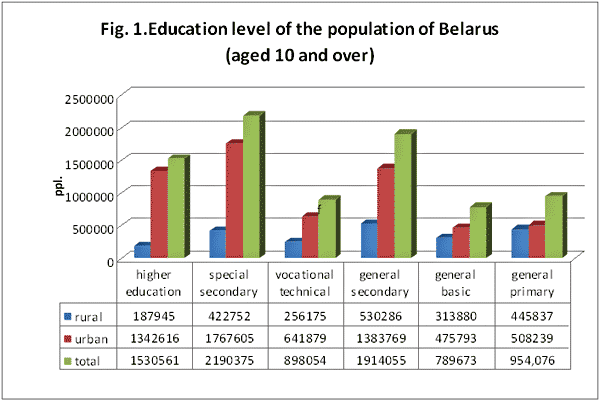
Source: National Statistics Committee, 20091
It is necessary to make efforts to estimate the educational level in Belarus not in absolute, but in relative indices and, moreover to provide their substantial interpretation. For example, is 1,530.5 thousand people with higher education a big or a small number for a country which successfully overcame an economic crisis and choose the path of innovative development? Does this fact mean that 1.5 million people have a high standard of living and form the cultural layer of the population that defines developmental trends of the country?
According to the population census, out of 7,246.2 thousand people aged from 6 to 60 about 1,719.8 thousand people (23.7%) received training in educational institutions on the territory of the country. Out of them 26.2% – are in the system of higher education, 9.8% – in special secondary education, 5.7% – in vocational schools and 58% – in general secondary education. Training captures almost all groups of the population. Basically, it is the young generation aged 6 to 24 that receives the education.
The involvement in education decreases for groups of the population aged 25 and over and practically drops to nothing for those aged 60 (Fig. 2). Global tendencies such as “Life-Long Learning” remain a goal for the future rather than a present fact.
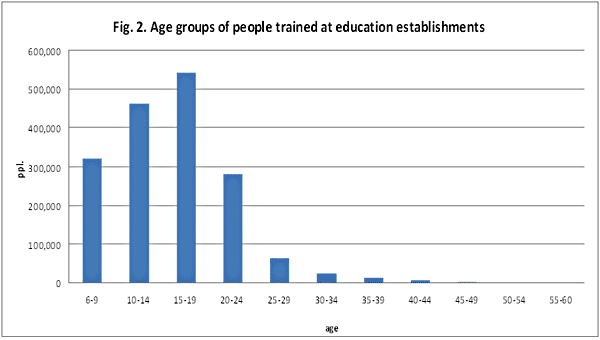
Source: National Statistics Committee, 2010
According to the results of the population census the data about distribution of the population from the point of view of command of the Belarusian and Russian languages were obtained. About 53.2% of the population called Belarusian their native language, 41.5% called Russian their native language. However in daily communication only 23.4% of the total number of population uses Belarusian, Russian is used by 70.2% of the population. These data brightly testify to the fact that during the whole period of the country’s independence the program of Belarusization in the education system was not placed on a broad footing, and it is unknown whether it will be brought into the agenda in the near future.
As of the beginning of 2010/2011 academic year there were 4,097 preschool institutions, 3,584 day state comprehensive schools, which is by 72 establishments less than last year, from them 212 – grammar schools, 32 – lyceums. Besides, at the beginning of the academic year 9 private educational institutions operated in the Republic (the number of pupils – 558).
Analyzing the official data of Main Information and Analytical Centre of the Ministry of Education of the Republic of Belarus, it is possible to fix an obvious tendency towards the decrease in the number of pupils of comprehensive schools. The principal cause of such reduction is the demographic factor. An attempt to compensate consequences of the comprehensive school reform (1994-2008), the change of planning and decision-making at the governmental level about the number of budgetary and paid places at the educational establishments led to an insignificant increase in the number of students at technical training colleges and special secondary educational establishments and to a powerful gain of students at the institutions of higher education (about 12 thousand per year) (Fig. 3).
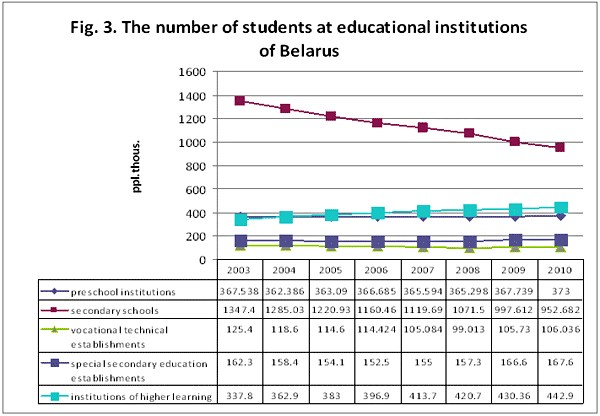
Source: Main Information and Analytical Centre of the Ministry of Education of the Republic of Belarus, 20102
The number of teaching employees at comprehensive schools decreases (Fig. 4), the number of higher-education teaching personnel increases a little (from 22,542 in 2002/2003 to 24,451 in 2009/2010 academic year). On average, the nominal accrued salary of teaching employees was BYR 881,9343 .
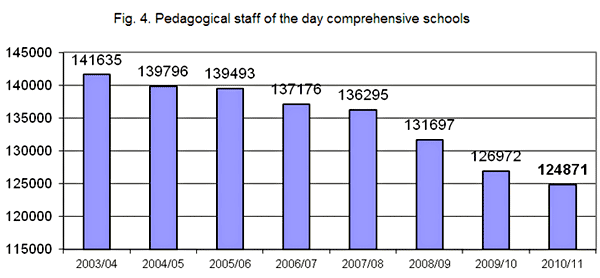
Source: Main Information and Analytical Centre of the Ministry of Education of Belarus, 2010
According to the indices, the vocational training system is characterized by stability (Fig. 5). As of 2010/2011 academic year, it includes 222 state vocational schools and 7 private ones, 202 state special secondary education establishments and 12 – private ones, 45 state higher educational institutions and 10 private ones.
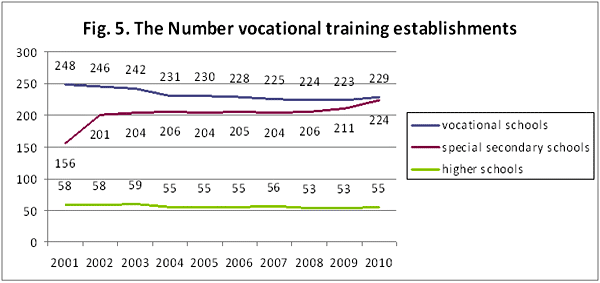
Source: Main Information and Analytical Centre of the Ministry of Education of Belarus, 2010
On the whole, over the last 10 years the structure of the education sphere and the control system did not undergo essential changes in Belarus. Such structural stability, on the one hand is justified under the conditions of mass education, whose process is provided by certain standards, publication of textbooks, material and information equipment of educational institutions, etc. But, on the other hand, the absence of tendencies of development and updating in education, conceptual and strategic uncertainty in the conditions of global development generate social and economic threats. This has already become obvious both for consumers of educational services and for subjects of the labor market, scientists and politicians.
The problem of the quality of Belarusian education that has been discussed throughout the last 5-6 years remains unsolved. The main reasons for such a long stagnation is an excessive bureaucratization of the education system, the state monopoly in educational services, simulation forms of social partnership and market relations in this sphere. Existing conceptual and scientific standards concerning the quality of education, the attempt to use international quality standards ISO 9000 cannot be adequately integrated into the current Belarusian education system if out-of-date stereotyped and ideological principles of education management are preserved. Such duality (on the one hand, there are certain standards, on the other hand – the corresponding control system is absent) leads to the discredit of the whole “Quality Management” campaign.
Working out and introduction of the Quality Management System (QMS) on the basis of international standards are quite productive for mobilization of the resource available in educational establishments, for streamlining and ordering of internal activity of an organization. But the main condition of effective introduction of such system is free market of educational services, competition, academic freedoms, economic independence of educational institutions and reflective attitude of administrations and councils of the institutions of higher learning to formation of their own strategy and policy. Application of the standard in management cannot replace in any way the processes of “cultivation” of a new human potential and generate new subjects of development in education. On the contrary, the introduction of standards disables an administrative reflection, in many respects deprives of independence and consolidates the principles of the Soviet administration managerial control, the essence of which is to act according to stereotypes.
As such standards are introduced into the educational institutions, the air of freedom and creativity disappears there. Universities cease to be universities inherently. At schools the prestige and value of knowledge falls. Under these circumstances, teachers need not think how to improve sending the message and essence of the courses – it is more important to have enough time to give all lectures, to write the plan of academic and educational activity, to raise formally the level of their skills. For a student it is important to pass tests or examinations, “to get a wallpaper degree”, rather than to join the professor in a discussion, to understand a problem in its essence. Indices of pedagogical and educational activity will be fulfilled but the necessary quality and content will not appear. In the humanitarian sphere where education also belongs, the consequences of a formalistic approach will come in due time. It is safe to predict that prestige of Belarusian diplomas of the higher establishments will decrease in comparison with the Russian and foreign ones, that the Belarusian school leavers will continue their education in other countries.
In 2010 the new fashion in education focused on quality, can be considered as an attempt to transfer administrative activity from the level of strategic management, program development and substantial aspects to the average level of administration and standardization. The Ministry of Education and other state executive power bodies should be engaged in both activities. But they do only what they can4 .
Education and politics
The year 2010 was not only the year of quality, stable functioning, regulatory actions and standardization for education. It was the year of traditional participation of educators in the election campaign. Politicians are inclined to see the main administrative resource in the education system – thousands of teachers work in election committees, voting precincts are located in educational institutions. Through schools and kindergartens it is possible to carry out efficient interaction with the population, parents and students, to wage PR campaigns and other actions. The authority actively uses this resource. Alexandr Radkov, the Minister of Education and at the same time the leader of the public association Belaya Rus (White Rus) headed President Lukashenko's pre-election campaign team. This fact did not surprise or confuse anyone, either politicians or representatives of the civil society.
Article 12 of the Education Code declares a completely different approach to the political activity in education establishments: “In educational institutions of Belarus the activity of political parties or other public associations whose aims are political, also the children's, teenage or youthful associations that act exclusively on the basis of charters of such parties or associations is forbidden”. Opposition parties and non-governmental organizations become by default included in the blacklists of the Ministry of Education, as well as certain teachers and professors who received an unspoken prohibition to practice. The interdiction does not apply to the organizations that are under the auspices of the state. Under the conditions of passivity and adaptability of the academic community and control of the management system over thinking, cynical and authoritative management style starts to prevail in educational institutions. Earlier adopted laws are rewritten to suit certain conditions of administration and control.
In December 2010, the Council of the Republic adopted the final variant the Education Code5 , which evoked ambiguous reactions of public organizations, business structures and the expert community. Within the context of the public initiative of the educational and human rights non-governmental organizations created in the middle of the year attempts to publicly criticize the Code project were undertaken and the written requests were sent to the Parliament. However, the deputies’ response can be estimated as nonprofessional if to put it mildly. The reasoning “people will not understand what informal education is” testifies to the preservation of the Soviet administrative methods of communications or to a deliberate unwillingness to join the dialogue with the representatives of the civil society and independent experts.
Last year an encouraging factor for renewal of democratization processes in education was some thaw in relations between Europe and Belarus, development of the Eastern Partnership program and other international educational programs. Many public educational organizations of Belarus considered the Eastern Partnership as a chance to start a dialogue between the civil society and the state including the education problems within the context of the fourth thematic platform “People to People”. The National platform of the Eastern Partnership Civil Society Forum whose leaders publicly declared their adherence to dialogue and law norms6 is created; the process of the working out of road maps in the frameworks of thematic platforms began7 .
Bologna process: a matter of technique
In 2010, the president and the Belarusian government changed their attitude towards the Bologna process several times. At the beginning of the year, Lukashenko rejected the suggestion of the Ministry of Education to enter the Bologna process. Then on June 7th at the meeting concerning higher school development and the quality of preparation of specialists, he demanded a more detailed study of the question from the Ministry. However, at any outcome the president was convinced that “it is necessary to keep the present education system”. The Ministry of Education tries to suit such directions, ascribing to the Bologna process the features in the logic of evolutionary character: “The Bologna process does not demand unification and submission, sharp revolutionary steps alienated from national contexts. What is important is a considered, complex, flexible strategy of an evolutionary development of education aimed at the increase of its quality”8 .
It is also stated that the country that enters the Bologna process is not supposed to carry out a number of principles (most likely, it is academic freedoms that are meant). Thus, the belated inclusion of Belarus into the international educational space is declared to be only a technical matter. That is, it is necessary to prepare a package of documents, to create an anonymous expert community, to take part in events and to report about the improvement of quality and increase in number of foreign students etc. The process goes on but, as usual, not on a program but administrative level.
Independent experts in the sphere of education V. Dunaev, V. Matskevich, A. Kozulin, etc. expressed their concern in connection with this succession of events9 . It is obvious that without a widespread public discussion, the participation of the academic and student's community in the discussion and the control of the civil society over Belarus’ entering into the Bologna process the process itself can turn into a show or a phony act.
The third sector: reaction or strategy?
Besides official programs a number of independent alternative platforms and projects are created in the educational sphere. On the basis of the Humanitarian Technologies Agency and Social Innovations Center under the direction of the philosopher Vladimir Matskevich the constant methodological seminar10 functions. In the frameworks of this seminar the idea of cultural policy and strategic game on university problems are developed, the club “Belarusian Philosophical Space” (Paval Barkouski, etc.) works11 . The process of creation of Universities of the Third Age, in particular on the basis of the non-governmental organization “Third Sector” (Hrodna)12 or the Social Service Territorial Centre of Lenin city district (Brest) is developed. Scales of student's and academic exchanges and study placements broaden13 .
From time to time the education questions are discussed in the context of economic problems and labor market development. International experts (the European Education Foundation, the World Bank), Belarusian business structures (Institute of Privatization and Management, the consulting company Zdes i seichas (‘Here and Now’) etc.), analytical centers (Humanitarian Technologies Agency, Center of European Transformation, BISS, “Strategy”, Mises Center etc.) take part in this discussion. International programs such as Erasmus Mundus, TEMPUS continue to work in Belarus but the scale of their activity does not increase.
After the events of December 19th, the Kalinouski Scholarship Program (“Salidarnasc” Center) received a new impulse and became very topical. Human rights organizations (the Center for Legal Technologies, “Viasna-96”) and independent associations of journalists (BAJ) continue their mini-educational programs.
With all diversity of processes, in general it is possible to say that the activity of the third sector in the sphere of education has a chaotic and reactive character. Independent educational structures lack a unified strategy and the program of education development in spite of the fact that the sufficient intellectual resource is concentrated in this sector. The factor of help and support from the international funds plays a huge role in adjustment and work coordination in non-governmental sector of education. However in relation to Belarus activity of these foundations should be reformatted and rethought taking into consideration the specificity of the situation in the country.
Conclusions and forecast
Belarusian education will continue to evolve according to variable demographic, technological and social factors. External political and economic processes will periodically "stir up" the education system. Probably, it will lead to some revision of the basic ideological and conceptual grounds, however not to their essential change or to a start of a new round of education reforming.
The Education Code accepted in December 2010 will cause some confusion among the structures of post-secondary education as of September 1st, 2011 they will have to function according to the new rules.
It is possible to predict with confidence the tightening of administrative and bureaucratic mechanisms of management at all levels, which sooner or later will balance and stabilizes the system, will bring the real practice of education into accord with public and private norms.
Entrance into the Bologna process will not essentially change the quality and structure of the education system, but it will substantially shake up the activity of administrative structures. Most likely, the education system management will suggest various plans and programs on modernization of higher and vocational education, motivated rather on the level of additional financing than on the level of content.
Non-governmental subjects in the system of the Belarusian education, academic community, noncommercial and business organization can be competitive with the state only under the condition of the common strategy, the concept of development and joint actions on consolidation. Otherwise, the further state monopolization of the educational sphere and stagnation of the system on the whole will prevail.
1 See: http://belstat.gov.by/homep/ru/perepic/2009/itogi1.php.
2 See: http://www.giac.unibel.by/ru/main.aspx?guid=16281.
3 See: http://belstat.gov.by/homep/ru/indicators/wages.php.
4 For the results of work of the Ministry of Education in 2010 and main tasks for 2011 see: Report of the first Deputy Minister of Education of Belarus Aleksandr Zhuk // [Electronic resource] Mode of access: http://minedu.unibel.by/main.aspx?guid=-42283.
5 http://www.president.gov.by/press110548.html;
http://www.belta.by/ru/all_news/society/Sovet-Respubliki-prinjal-proekt-Kodeksa-ob-obrazovanii_i_536916.html
6 http://eurobelarus.info/content/view/4856/164/
7 http://eurobelarus.info/content/view/3998/164/
8 A. Zhuk Higher Education of Belarus: from the Bologna process to the European space of higher education // [Electronic resource] Mode of access: http://minedu.unibel.by/
9 See: http://www.zautra.by/art.php?sn_nid=5756&sn_cat=19; http://belapan.com/archive/2010/02/08/eu_eu1928/; http://www.aif.by/ru/articles/social/item/12677-evropa.html?tmpl=component&print=1.
10 See: http://methodology.by.
11 See: http://www.prastora.org/
12 See: http://uzv-hrodna.blogspot.com/
13 See: http://adukacyja.info/news.
|

